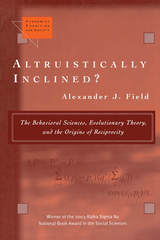
Altruistically Inclined? examines the implications of recent research in the natural sciences for two important social scientific approaches to individual behavior: the economic/rational choice approach and the sociological/anthropological. It considers jointly two controversial and related ideas: the operation of group selection within early human evolutionary processes and the likelihood of modularity—domain-specific adaptations in our cognitive mechanisms and behavioral predispositions.
Experimental research shows that people will often cooperate in one-shot prisoner's dilemma (PD) games and reject positive offers in ultimatum games, contradicting commonly accepted notions of rationality. Upon first appearance, predispositions to behave in this fashion could not have been favored by natural selection operating only at the level of the individual organism.
Emphasizing universal and variable features of human culture, developing research on how the brain functions, and refinements of thinking about levels of selection in evolutionary processes, Alexander J. Field argues that humans are born with the rudiments of a PD solution module—and differentially prepared to learn norms supportive of it. His emphasis on failure to harm, as opposed to the provision of affirmative assistance, as the empirically dominant form of altruistic behavior is also novel.
The point of departure and principal point of reference is economics. But Altruistically Inclined? will interest a broad range of scholars in the social and behavioral sciences, natural scientists concerned with the implications of research and debates within their fields for the conduct of work elsewhere, and educated lay readers curious about essential features of human nature.
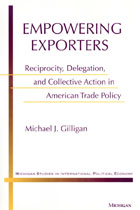
Michael Gilligan argues that liberalization has succeeded because it has been reciprocal with liberalization in other countries. Our trade barriers have been reduced as an explicit quid pro quo for reduction of trade barriers in other countries. Reciprocity, Gilligan argues, gives exporters the incentive to support free trade policies because it gives them a clear gain from free trade and thus enables the exporters to overcome collective action problems. The lobbying by exporters, balancing the interests of groups seeking protection, changes the preferences of political leaders in favor of more liberalization.
Gilligan tests his theory in a detailed exploration of the history of American trade policy and in a quantitative analysis showing increases in the demand for liberalization as the result of reciprocity in trade legislation from 1890 to the present. This book should appeal to political scientists, economists, and those who want to understand the political underpinnings of American trade policy.
Michael J. Gilligan is Assistant Professor of Politics, New York University.
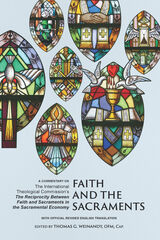
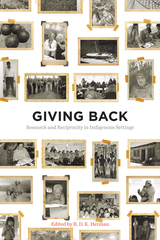
How can scholars best give back to the communities in which they conduct their research? This critical question arises from a long history of colonial scholarship that exploited study subjects by taking knowledge without giving anything in return. It is a problem faced by all field researchers, even those working in their own communities.
Over the past several decades—and especially since the evolution of feminist methodologies, participatory research, and the postcolonial turn in the 1990s—there have been calls for research to be less exploitative, but also for researchers and for the research itself to give something back. Giving Back: Research and Reciprocity in Indigenous Settings addresses the need for reciprocity in the research process, especially (though not exclusively) in regard to indigenous communities.
The twelve case studies in this volume demonstrate that giving back can happen through the research itself—through the careful framing of questions, co-production of knowledge, and dissemination of results—but also through the day-to-day actions and attitudes of researchers that inevitably occur in the field. It can range from everyday give-and-take to the sharing of research materials to larger and longer-term engagements.
As practitioners of community-based research gain greater awareness of these issues, scholars and institutions need guidance and strategies for ensuring reciprocity in the research process. This volume presents a variety of situations from a wide range of research contexts, discusses what has and hasn’t worked, and explores what issues remain.
CONTRIBUTORS:
Jennifer Carter
Julia Christensen
Claire Colyer
David Crew
Erica A. D’Elia
Maria Fadiman
R.D.K. Herman
Richard Howitt
Stephanie Hull
Gwyneira Isaac
Chris Jacobson
Meredith Luze
Catrina A. MacKenzie
Lea S. McChesney
Kendra McSweeney
Janice Monk
Roxanne T. Ornelas
Tristan Pearce
Matthew Reeves
Chie Sakakibara
Wendy S. Shaw
Sarah Turner
John R. Welch

Download open access ebook here.


"By reciprocity Becker understands a complex disposition to make suitable return for the benefit we receive from others, to resist the harm others inflict on us rather than retaliate for it, and to make restitution for the harm we ourselves cause. . . . This is a clearly written book which makes fresh contributions to a number of topics."—A. D. M. Walker, Philosophical Books
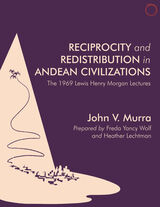
Murra intermixes a study of Andean ecology with an exploration of the ideal of economic self-sufficiency, stressing two foundational socioeconomic forces: reciprocity and redistribution. He shows how both enabled Andean communities to realize direct control of a maximum number of vertically ordered ecological floors and the resources they offered. He famously called this arrangement a “vertical archipelago,” a revolutionary model that is still examined and debated almost fifty years after it was first presented in these lecture. Written in a crisp and elegant style and inspired by decades of ethnographic fieldwork, this set of lectures is nothing less than a lost classic, and it will be sure to inspire new generations of anthropologists and historians working in South America and beyond.
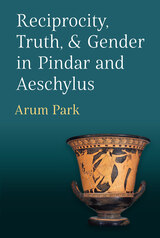
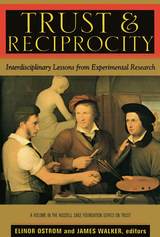
READERS
Browse our collection.
PUBLISHERS
See BiblioVault's publisher services.
STUDENT SERVICES
Files for college accessibility offices.
UChicago Accessibility Resources
home | accessibility | search | about | contact us
BiblioVault ® 2001 - 2024
The University of Chicago Press









